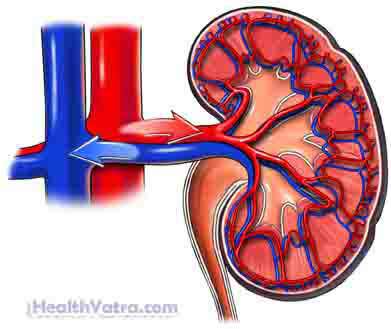Definition
The kidneys are a pair of bean-shaped organs that filter and remove waste from the blood. Stenosis is narrowing that restricts an opening. Renal artery stenosis occurs when a kidney (renal) artery narrows, causing a decrease in blood flow to that kidney.

Each kidney is capable of regulating the body’s blood pressure to assure that each organ has an adequate supply of oxygenated blood. This happens by activating a cascade of hormones known as the renin-angiotensin system.
Renal artery stenosis triggers the release of these hormones, which then causeshypertension (high blood pressure). Since hypertension is a leading cause of strokesand heart attacks, this is a serious condition that requires diagnosis and treatment.
Renal artery stenosis can also eventually lead to loss of renal function, but since one kidney can perform adequately by itself, both kidneys would have to be affected forkidney failure to occur. Both renal arteries are involved 30% of the time.
Causes
There are several diseases of arteries that can cause them to become narrowed, including:
- Atherosclerosis (the most common)
- Fibromuscular dysplasia
Risk Factors
The following factors increase your chance of developing renal artery stenosis. If you have any of these risk factors, tell your doctor:
- Sex: male
- Age: over 50
- Atherosclerosis elsewhere in your body
- Previous stroke or heart attack
- Smoking
- Hypertension
- Diabetes
Symptoms
High blood pressure is the main finding. Only 1%-5% of cases of high blood pressure are caused by renal artery stenosis. This should be suspected if you:
- Develop high blood pressure when you are younger than 35 or older than 55
- Have sudden worsening of previously well-controlled hypertension
- Require multiple medications to control blood pressure
- Develop abnormalities in kidney blood tests after taking a certain type of blood pressure medication (ACE inhibitors)
High blood pressure is called the “silent killer? because it rarely produces symptoms until a stroke or heart attack occurs. The best way to detect it is to have routine blood pressure measurements. Renal artery stenosis is an unusual cause of hypertension, but an important one because it is curable. Most of the patients with the disease have no symptoms. However, it may also cause fluid retention, shortness of breath, headaches, and ankle swelling.
If both of the renal arteries are blocked, kidney failure occurs. Kidney failure can cause:
- Lethargy
- Decreased mental function
- Twitching
- Cramps
- Convulsions
- Nausea
- Vomiting
- Unpleasant tastes in the mouth
- Malnutrition
These symptoms are not specific for kidney failure and may be caused by other health conditions, either more or less serious. If you experience any one of them, see your doctor.
Diagnosis
Your doctor will ask about your symptoms and medical history, and perform a physical exam. If you have elevated blood pressure, a search for its cause can involve many different tests, but unless there is a specific reason to suspect renal artery stenosis, it may not be considered initially.
Tests may include the following:
- Repeat blood pressure measurements
- A battery of blood and urine tests
- Electrocardiogram (EKG, ECG)—a test that records the heart’ s activity by measuring electrical currents through the heart muscle
- A 24-hour urine collection
- Specific tests of your kidneys include:
- X-rays with intravenous contrast
- X-rays with contrast injected directly into the renal arteries
- Ultrasound examination of the kidneys
- Radioisotope imaging of the kidneys
- CT or MRI scans with or without injected contrast agents
Treatment
Talk with your doctor about the best treatment plan for you. If there is significant stenosis and you are healthy enough, repair of the artery is considered superior to medical treatment. Treatment options include the following:
Medication
Standard treatment for hypertension may be sufficient if blood pressure can be controlled and the kidneys are functioning adequately. There are many drugs that lower blood pressure, an you may need several to achieve adequate control. These drugs are especially effective in those with only a single renal artery that is blocked. ACE inhibitors should not be used if hypertension is caused by bilateral renal artery stenosis.
Percutaneous Angioplasty
A thin tube is threaded into the renal artery from a puncture in your groin. The tube includes a balloon, laser, or other device that will open the narrowed artery.
Vascular Surgery
If the artery is not suitable for angioplasty, a surgeon may decide to repair the condition through an incision in your abdomen.
Nephrectomy
This is an option if the affected kidney has been so damaged that it no longer works, but still causes high blood pressure.
Prevention
There is no way to prevent renal artery stenosis other than to prevent atherosclerosis through exercising regularly, eating a heart healthy diet, quitting smoking, and drinking less alcohol.
